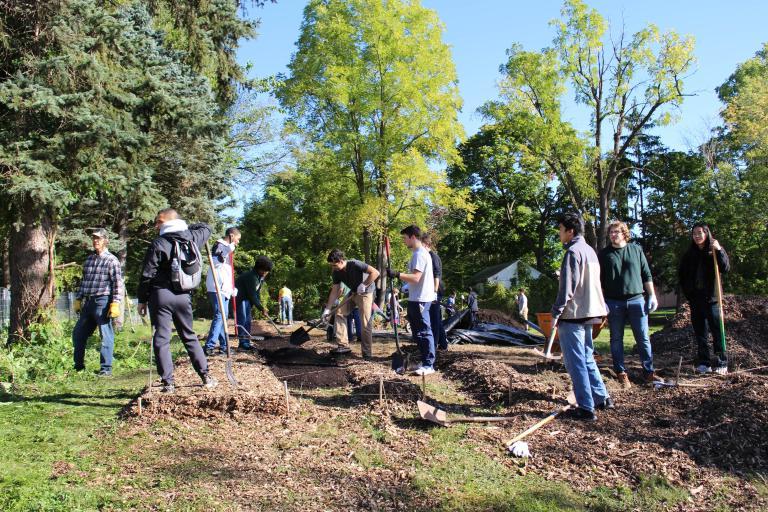
Nearly 200 Kettering University students, staff, faculty and alumni are taking on various community service projects this Saturday during the quarterly Service Saturday.
With community vitality as one of the University’s Pillars of Success, the Kettering community is taking its customary hands-on approach for this event, which is also a part of new student orientation.
“Service Saturday represents an intentional effort to demonstrate that the University is committed to being a good neighbor and to playing an active role in supporting Flint’s revitalization. And just as importantly, it demonstrates to students that wherever they go as leaders in their respective industries, it is vitally important to be in tune with the community and be a force for good,” said Jack Stock, Director of External Relations. “It is a lesson in civics that says Kettering’s problem-solvers want to be a part of the solution wherever we go.”
New this Saturday, students will work on exterior projects such as landscaping, gutter repairs and garage cleanouts for residents of the Mott Park neighborhood.
“Mott Park is an intergenerational neighborhood. We have families, students, retired people and everything else,” said Chad Schlosser, President of the Mott Park Neighborhood Association. “Our retirees are not wealthy, and many might exist on Social Security. These are people who generally don’t utilize our park and may not really be impacted by the projects the students have helped with at the park. So we wanted to bring it closer to home and be a blessing to those most in need.”
In July, as students were clearing overgrown sidewalks, multiple neighbors came out to thank them, Schlosser said. That spawned the idea to have a more direct impact on the residents of the neighborhood.
Schlosser used social media to pinpoint which neighbors had the greatest need. He posted a photo from the July event on the association’s Facebook page, asking who needed the students to help at their homes. Seven neighbors signed up immediately.
Schlosser said that represents capacity for this event but hopes to do similar events like this in the future.
The University volunteers also will work with the Flint Children’s Museum, Mott Park Recreation Association and the Flint River Watershed Coalition on various projects. In addition, students will cover graffiti throughout the University Avenue Corridor.
The University has organized Service Saturday events for at least a decade.
Past projects included cleaning up blighted city lots, painting homes for residents, Flint River cleanups, planting trees, restoring grave sites, building playgrounds, working on the grounds of Durant-Tuuri Mott Elementary and more.
Service Saturday is just one part of the University’s commitment to the community.
In 2022, the University Avenue Corridor Coalition (UACC) turned 10. The coalition's footprint is McLaren Flint on the west to the University of Michigan-Flint on the east and from Hurley Medical Center/Whaley Children’s Center on the north to the Flint River and Chevy Commons on the south.
Since the UACC’s inception, more than 340 cleanup projects have been completed, hundreds of homes have been repaired, more than a dozen houses have been painted and more than 500 lights for community safety have been installed. Crime hot spots have been cut in half, and the coalition’s membership has increased 340%.
Also during that time, the University razed more than 70 blighted properties in the corridor and rebuilt others. The most significant projects include:
- Transforming a former convenience store at the corner of University and Chevrolet across the street from Kettering’s Campus Center into Einstein Bros. Bagels and a Flint Police Service Center.
- Replacing a former party store and dilapidated homes at North Grand Traverse and University Avenue with a commercial building that now houses Jimmy John’s and Little Caesars Pizza.
- Taking ownership of historic Atwood Stadium from the City of Flint, ensuring its focus remained as a community-focused site for high school and professional sports, events, and more. Upgrades to the structure and seating were made, along with the addition of new turf—the same type of turf used at Ford Field and Michigan Stadium.